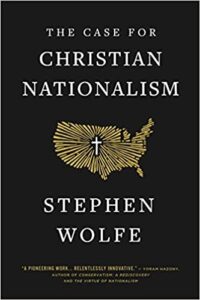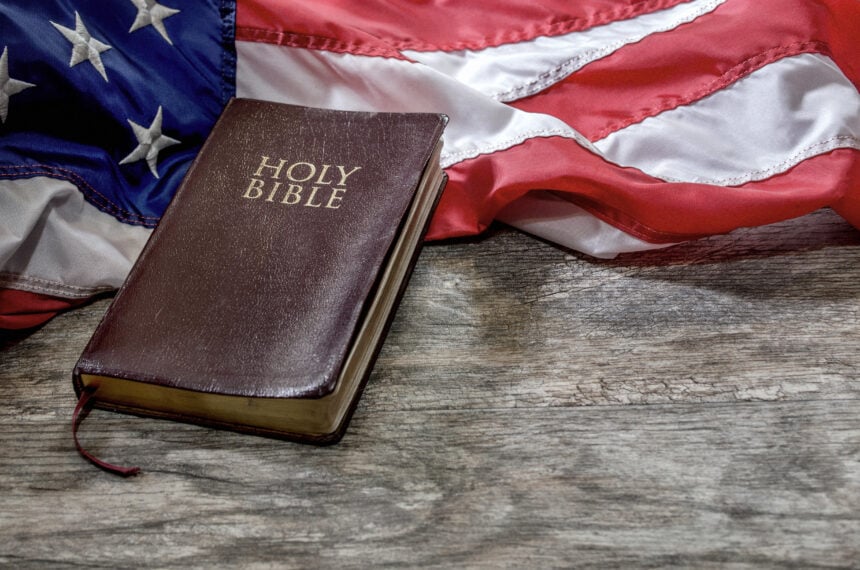This is the fourth article in a five-part series on Christian Nationalism. Following are links to the other parts: One, Two, Three, Five.
American institutions ought to be Christian, primarily Protestant, but with wide toleration of theological difference.
The conservative impulse is to deny the labels the left hurls at conservatism. I admit that, upon first hearing the term “Christian nationalism” around 2019, I instinctively rejected the term, knowing the left’s proclivity to construct derisive labels that say little about reality. After the term had circulated, activist academics jumped at the opportunity to lend their authority to the solidification of its bad and dangerous connotations. Thus, a handful of largely unimpressive sociologists have become the media’s go-to experts on the topic. This is how regime-approved “knowledge” is produced and distributed.
As I thought about the conceptual meaning of “Christian nationalism,” however, I discovered that I am indeed a Christian nationalist. That is, I am both a Christian and a nationalist; and I want my nation to be a Christian nation that acts for Christian ends. Furthermore, I concluded that the policy emphases of nationalism are crucial for our moment in the West. Western nations are undergoing national suicide, driven by guilt, malaise, and cultural fatigue. They lack the national will to live, to flourish, and to perpetuate. They have a will only to die.
Nationalism is essential in our time. It is not enough to simply reassert classical Christian political thought or, in the case of America, to look back to the Founding Fathers. There must be a reinvigoration, rooted in the love of people and place—something that stirs the national soul to boldness and resolve to seek the good of the nation. Nationalism provides that spirit for life and action. We need both Christianity and nationalism.
I view Christian nationalism not as a synthesis of Christian populist views, nor is my intent either to defend or denounce the theological and political positions of those who identify as Christian nationalists. Rather, I define it according to the meaning of the words involved: “nation,” “nationalist” and “Christian”. Thus, Christian nationalism means a Christian nation that is conscious of itself as such and that acts through civil law and social custom to seek its earthly and heavenly good. The key elements are the national self-conception of Christian nationhood, the national will to act for its good, and the recognition of the twofold division of goods—temporal and eternal.
Most evangelicals among American elites deny the possibility of a Christian nation, assuming that it immanentizes the eschaton—bringing heaven to earth, collapses the sacred and secular—or misapplies the idea of redemption, which is reserved only for individuals, not collective nations. But this misunderstands and over-theologizes the idea of a Christian nation.
Each Christian nation is not merely a collection of Christians, as if belonging to a Christian people is merely a matter of sharing a baptized status and the promise of eternal life. Rather, each nation is fundamentally a particular people, having similar customs, traditions, and ancestral ties to great national events and struggles.
The Christian nation is analogous to the Christian family. The Christian family is fundamentally a thing of nature—a union of man and woman having or expecting children. Thus, the marriage of your non-Christian neighbors is not invalid; indeed, it is just as valid as marriages between Christians. But such marriages are incomplete, lacking what perfects them—namely the action of grace. The Christian family is a complete family, not because families are sinless but because they are under Christ. They pray with one another in Christ; they worship together in Christ; they forgive one another in Christ; they share and support one another in their common spiritual good, namely Christ. The Christian family is a society ordered to the highest good without eliminating the lower goods. Grace does not destroy what is earthly, but rather orders the earthly toward the heavenly. Furthermore, grace does not homogenize all Christian families; individual families retain their distinctive characteristics. They are of the same form, but no two Christian families are identical in their character and activities.
Christian nations are similar. Grace completes the nation not by supplying a universal “gospel culture” that homogenizes all peoples. Nor does this completeness confound the distinctions between heaven and earth or between the sacred and the secular; rather, grace completes the nation by ordering what is fundamentally earthly toward the support of what is heavenly—just as the body is the vessel of the soul. This analogy is admittedly abstract, but the meaning becomes clearer when we discuss civil law and social custom.

A Christian nation acting for its good must enact a Christian body of law. Now, this law (like all bodies of law) will consist of universal commands that are not exclusively Christian, such as the prohibition of murder. But a Christian body of law also contains what is distinctive to Christianity, serving pedagogically to normalize Christianity in civil society. These may include Sabbath laws (i.e., “blue laws” prohibiting some labor and buying and selling on Sundays), punishments for blasphemy, and laws ensuring Christian norms within public institutions, such as schools. When such laws are present, the body of law is Christian, for in its totality the law directs man to the goods of his temporal and eternal life. Of course, Christian law cannot compel faith, but it can outwardly order people toward the Christian faith.
Thus, a Christian nation would have an inherent social force, expressed outwardly in social customs, that orients the people to Christian things and directs the people to relate to each other as Christians. That is, Christian peoplehood is a sort of social fact that normalizes Christianity. In coordination with civil law, which compels only the body, social force inclines the people to assent to Christian truth. This inclination does not save their souls; one must have true faith, which is a gift of God. But it leads them to the recognition of Christian truth, effectively removing intellectual hindrances to faith. Cultural Christianity also generates social trust and positive social expectations. Thus, normalized Christianity orients people both to heavenly life and results in a commodious earthly life.
We need a Christian prince, who with gravitas and force of personality will bring Western nations to Christian national consciousness—tearing us from our complacency, weak will, and self-doubt.
This vision of Christian civil law and Christian social custom is impossible without a Christian civil ruler. This man would be a “minister of God” (Romans 13:6), possessing a temporal ruling power of God for the good of God’s people. The source of his rule is from God through consent of the people, not via any ecclesial head or international church. This is not “theocracy” but he does seek the eternal good of his people through licit means. He enacts law and sets the example for his people through his love of God, his countrymen, and his homeland. He would protect both their bodies and souls. His power is secular and temporal, but he is authorized and obligated to order his people to what is eternal. He supports the administration of sacred things—offered by the instituted church—without usurping the power of church ministers.
These are the ordinary roles of the Christian magistrate or civil ruler, but our day calls for something more. We need a Christian prince, who with gravitas and force of personality will bring Western nations to Christian national consciousness—tearing us from our complacency, weak will, and self-doubt. No such prince has yet arisen, but we should look for one and expect that God will raise one up for us.
In the Protestant understanding of Christian nationalism, churches necessarily renounce temporal power. They cannot and should not bind civil authorities to particular civil policies, nor depose errant rulers. Pastors are to civil rulers what chaplains are to military commanders: they exist principally to serve the spiritual needs of the people, orienting them in heart to eternal life, and to advise civil rulers on spiritual things and on biblical morality. Civil society is the host of the church, making the church subject to its outward hospitium (i.e. the Greek concept of the divine right of hospitality between guest and host) and jurisdiction. Still, pastors ought to exhort their flocks to cooperate in a national project of greatness.

Each Christian nation is not merely a collection of Christians, as if belonging to a Christian people is merely a matter of sharing a baptized status and the promise of eternal life. Rather, each nation is fundamentally a particular people, having similar customs, traditions, and ancestral ties to great national events and struggles. Contrast this with the great error of American evangelicalism today, which supposes that spiritual unity is sufficient for achieving the highest form of civil fellowship. This is simply foolish and contrary to basic experience. Common humanity and a common title to heaven are wholly insufficient criteria for living well together. Without a common language, for example, no collection of people can conduct and complete civil projects and deliberate on the good of the nation. Thus, I envision a multiplicity of Christian nations, each respecting the others but preferring its own. Each has, as its first love, its own people and place.
Of course, I’m speaking of ideals and principles. Western Christians can see the dire state of our nations, and each has its own political traditions and possibilities. Americans have a long tradition of religious liberty, exemplified in our founding. The liberty of conscience—both inward liberty of belief and outward liberty to express our beliefs—is central to our tradition. While I do not want to reenact Europe’s wars of religion in America, we must roll back the post-World War II drift into secular liberalism. American institutions ought to be Christian, primarily Protestant, but with wide toleration of theological difference. Public schools, for example, must be Christian, integrating Bible norms into the curricula and administration.

All of this is easier said than done. But the principles need to be articulated. What we need most is the national will to recover our Christian heritage, and secondly civil leaders who will resist the moral insanity of the current American regime and replace it with Christian rule. I wrote The Case for Christian Nationalism to prepare for our moment—to give us the principles and motivation to seize the day when it comes. We must be watchful with piety and devotion to God, waiting patiently on divine providence for our opportunity. Christian nationalists, anticipating our opportunity, must train the will for action.



Leave a Reply